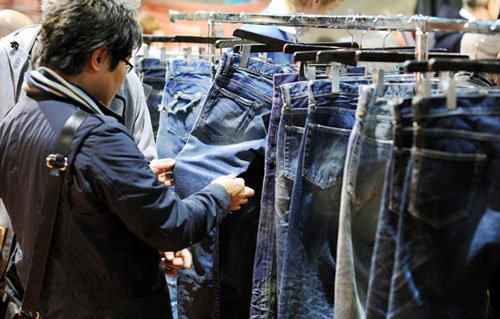AFP
Dec 8, 2008
Plastic jeans, denim paper, thanks to fashion's eco-warriors
AFP
Dec 8, 2008
PARIS, Dec 8, 2008 (AFP) - Take a load of empty plastic water bottles to manufacture jeans, or turn waste denim into paper: as eco-consciousness spreads, makers of the planet's most popular item of clothing are increasingly resorting to recycling.
 Denim by Première Vision Paris - Photo : Stéphane Kossmann/©Première Vision SA |
High-end makers of the denims and accessories that go into producing the now 150-year-old jean placed environmental concerns top of their agendas at a gathering in Paris this week of the denim-to-jeans industry.
And given the environmental fall-out of the emblematic blue pants since they crept to the top of the fashion charts from the 1960s, jean-makers have little other choice.
Greece's Hellenic Fabrics, for instance, a leading supplier to iconic jeans firm Levi-Strauss, is launching a new denim fabric made 37 percent of waste plastic bottles recycled as PET, a polyester synthetic fibre.
Italy's specialist tags and labels company Cadica is transforming used denim into paper pulp, while hi-tech Belgians UCO Sportswear weaves denim from waste threads.
"We are 100 percent ethical," the Greek company's research and development manager Panos Sofianos told AFP. "We already had an organic line, but wanted to find a way to use waste.
"This is not just business, it's for the environment, for our children."
Likewise in Belgium, said product development manager Sibilla Vanderlinden, who explained that her company collects cotton thread leftovers in spinning mills in Italy and Belgium to make new fabric.
-- 'We are 100 percent ethical' --
----------------------------------
"It's not as solid and is harder to dye than new thread," she said. "But we are sceptical that much of the so-called organic cotton on the market is really chemical-free and prefer to work this way in favour of the environment."
The Italian labels firm for its part collects unsold pants from jean-makers to produce paper pulp then turned into labels which are sold back to jean-makers.
"Our philosophy is to maximise the use of natural products and to recycle," said Italy's Paolo Pavarotti.
Cotton has long been criticised for harming the environment, but since fashionistas cottoned on to jeans, the up-market version of the once-upon-a-time workwear too has come in for flak.
Making brand-new jeans look 10 years old or more to please buyers is one of the most technologically advanced processes in the textile business.
Jeans are made to look naturally aged only once stitched together, by being washed and distressed over and over by pumice stones, then frayed, stained and ripped. The process not only causes water wastage but the chemicals and dyes impact on the environment.
Using organic cottons, or weaving denims with linen or even silks, is definitely on the increase across the industry, but environmentally-correct items remain a niche product, according to specialists at this week's "Denim By Premiere Vision" event.
Denim-makers meanwhile are also moving into "intelligent" fabrics, with hi-tech weavers developing cloth that regulates body-heat, keeps the rain out or even moisturises the skin.by Claire Rosemberg
Copyright © 2024 AFP. All rights reserved. All information displayed in this section (dispatches, photographs, logos) are protected by intellectual property rights owned by Agence France-Presse. As a consequence you may not copy, reproduce, modify, transmit, publish, display or in any way commercially exploit any of the contents of this section without the prior written consent of Agence France-Presses.
























